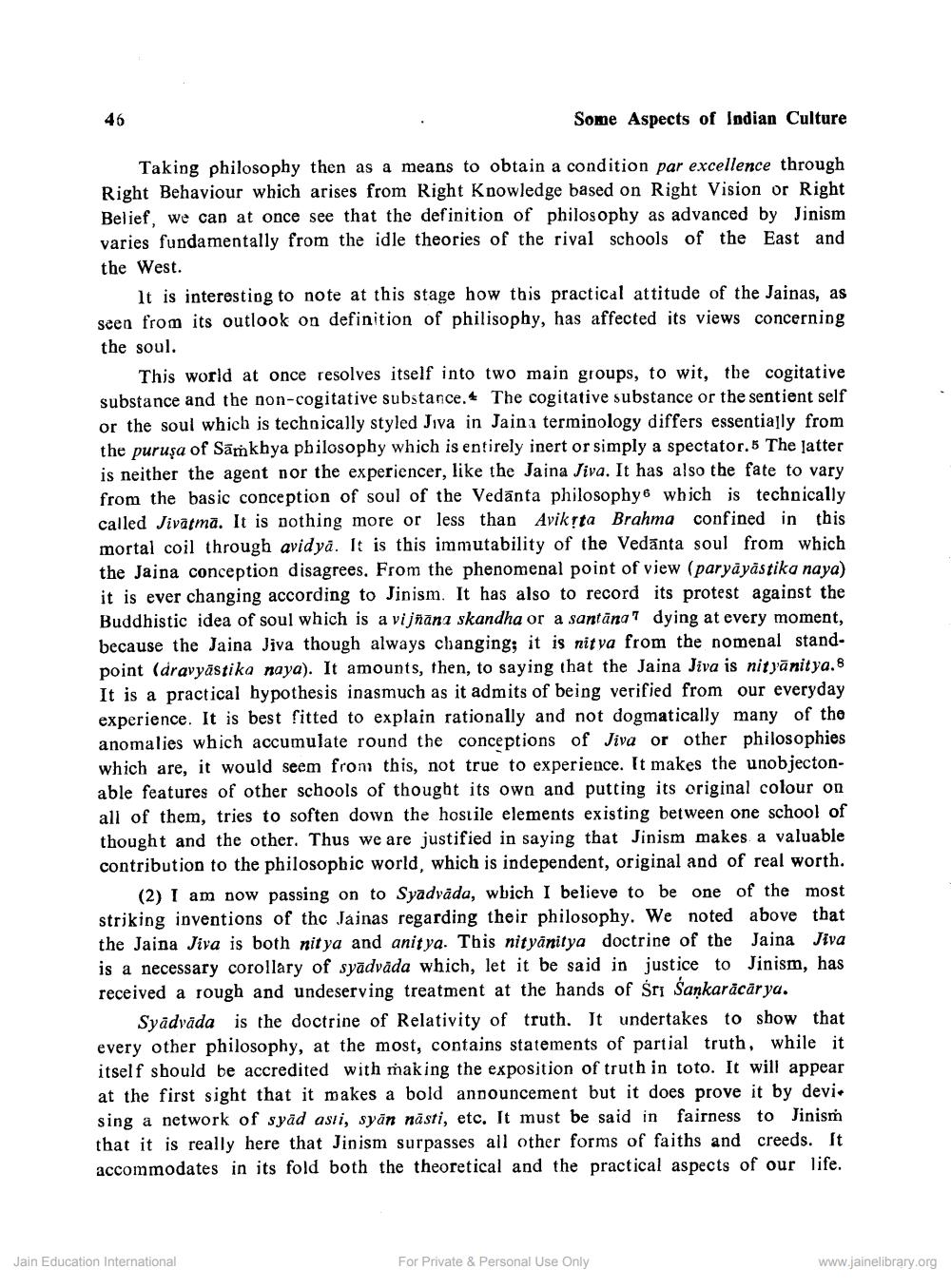________________
Some Aspects of Indian Culture
Taking philosophy then as a means to obtain a condition par excellence through Right Behaviour which arises from Right Knowledge based on Right Vision or Right Belief, we can at once see that the definition of philosophy as advanced by Jinism varies fundamentally from the idle theories of the rival schools of the East and the West.
It is interesting to note at this stage how this practical attitude of the Jainas, as seen from its outlook on definition of philisophy, has affected its views concerning the soul.
This world at once resolves itself into two main groups, to wit, the cogitative substance and the non-cogitative substance. 4 The cogitative substance or the sentient self or the soul which is technically styled Jiva in Jaina terminology differs essentially from the puruşa of Samkhya philosophy which is entirely inert or simply a spectator,5 The latter is neither the agent nor the experiencer, like the Jaina Jiva. It has also the fate to vary from the basic conception of soul of the Vedānta philosophy6 which is technically called Jivätma. It is nothing more or less than Aviksta Brahma confined in this mortal coil through avidya. It is this immutability of the Vedanta soul from which the Jaina conception disagrees. From the phenomenal point of view (paryāyāstika naya) it is ever changing according to Jinism. It has also to record its protest against the Buddhistic idea of soul which is a vijñāna skandha or a santānal dying at every moment, because the Jaina Jiva though always changing; it is nitya from the nomenal standpoint (dravyāstika naya). It amounts, then, to saying that the Jaina Jiva is nityānitya. 8 It is a practical hypothesis inasmuch as it admits of being verified from our everyday experience. It is best fitted to explain rationally and not dogmatically many of the anomalies which accumulate round the conceptions of Jiva or other philosophies which are, it would seem from this, not true to experience. It makes the unobjectonable features of other schools of thought its own and putting its original colour on all of them, tries to soften down the hostile elements existing between one school of thought and the other. Thus we are justified in saying that Jinism makes a valuable contribution to the philosopbic world, which is independent, original and of real worth.
(2) I am now passing on to Syadväda, wbich I believe to be one of the most striking inventions of the Jainas regarding their philosophy. We noted above that the Jaina Jiva is both nitya and anitya. This nityānitya doctrine of the Jaina Jiva is a necessary corollary of syādvāda which, let it be said in justice to Jinism, has received a rough and undeserving treatment at the hands of Sri Sankarácārya.
Syadvāda is the doctrine of Relativity of truth. Jt undertakes to show that every other philosophy, at the most, contains statements of partial truth, while it itself should be accredited with making the exposition of truth in toto. It will appear at the first sight that it makes a bold announcement but it does prove it by devi. sing a network of syäd asti, syān nästi, etc. It must be said in fairness to Jinism that it is really here that Jinism surpasses all other forms of faiths and creeds. It accommodates in its fold both the theoretical and the practical aspects of our life.
Jain Education International
For Private & Personal Use Only
www.jainelibrary.org




